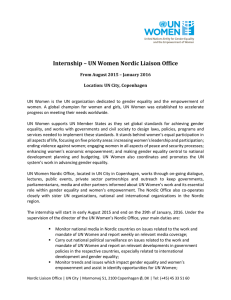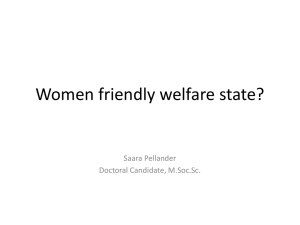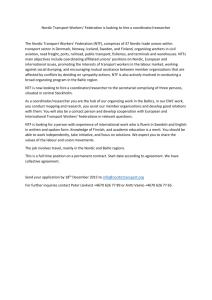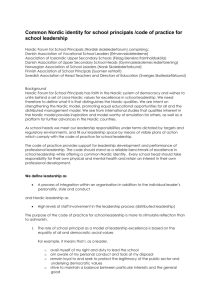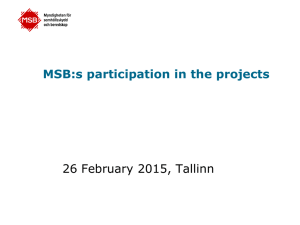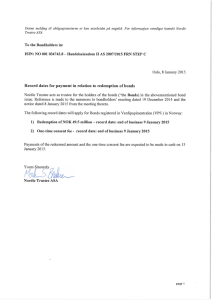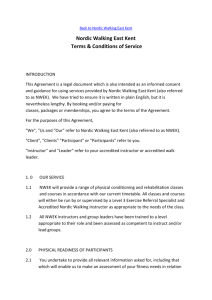University of Kent
advertisement
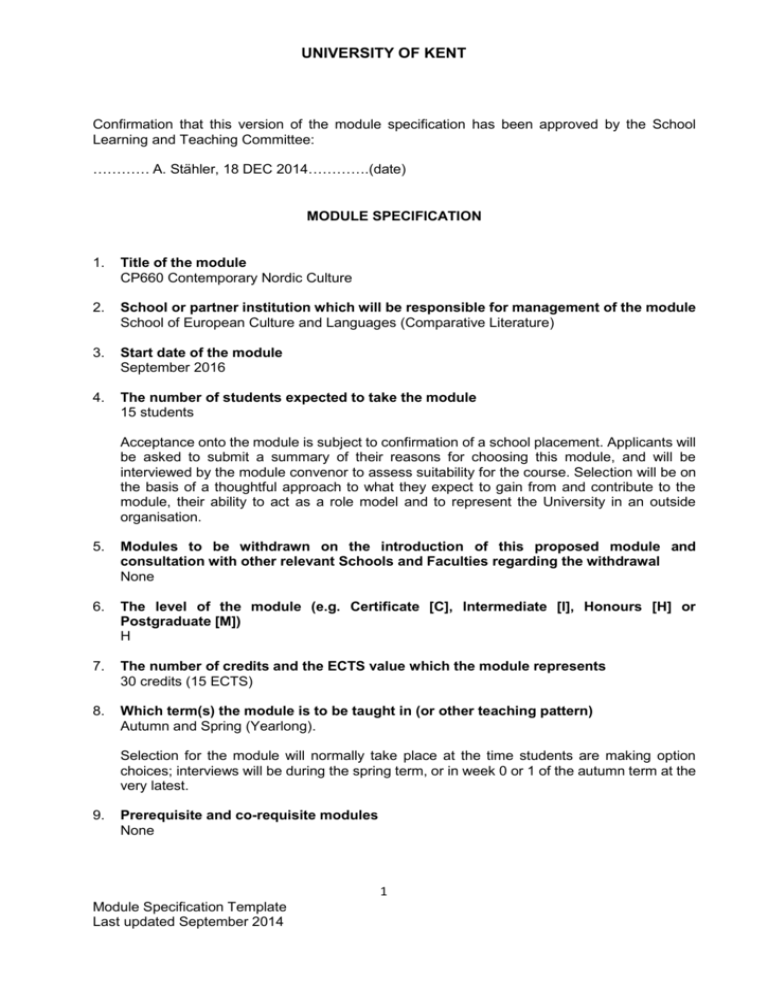
UNIVERSITY OF KENT Confirmation that this version of the module specification has been approved by the School Learning and Teaching Committee: ………… A. Stähler, 18 DEC 2014………….(date) MODULE SPECIFICATION 1. Title of the module CP660 Contemporary Nordic Culture 2. School or partner institution which will be responsible for management of the module School of European Culture and Languages (Comparative Literature) 3. Start date of the module September 2016 4. The number of students expected to take the module 15 students Acceptance onto the module is subject to confirmation of a school placement. Applicants will be asked to submit a summary of their reasons for choosing this module, and will be interviewed by the module convenor to assess suitability for the course. Selection will be on the basis of a thoughtful approach to what they expect to gain from and contribute to the module, their ability to act as a role model and to represent the University in an outside organisation. 5. Modules to be withdrawn on the introduction of this proposed module and consultation with other relevant Schools and Faculties regarding the withdrawal None 6. The level of the module (e.g. Certificate [C], Intermediate [I], Honours [H] or Postgraduate [M]) H 7. The number of credits and the ECTS value which the module represents 30 credits (15 ECTS) 8. Which term(s) the module is to be taught in (or other teaching pattern) Autumn and Spring (Yearlong). Selection for the module will normally take place at the time students are making option choices; interviews will be during the spring term, or in week 0 or 1 of the autumn term at the very latest. 9. Prerequisite and co-requisite modules None 1 Module Specification Template Last updated September 2014 UNIVERSITY OF KENT 10. The programmes of study to which the module contributes BA Comparative Literature; BA World Literature; BA German. Also available as a Wild Module. 11. The intended subject specific learning outcomes On successful completion of this module students will be able to: 1. Demonstrate systematic knowledge and critical understanding of central, interrelated aspects of contemporary Nordic culture, ranging from history, sociology and architecture, to literature, theatre, film, television series and innovation culture. 2. Demonstrate cogent understanding of the cultural, historical and political contexts at work in Scandinavia today. In addition, students will be able to show appreciation of the ways in which the different traditions of the Nordic countries interrelate within these contexts, with a particular view to their role in company cultures. 3. Exhibit the analytical skills required to critically assess, evaluate and explain the distinctive features of Nordic culture with reference to the contexts listed in (2) above. 4. Critically analyse and compare Nordic cultural artefacts and phenomena in their relevant contexts. 5. Evaluate how these artefacts and phenomena play into company cultures of innovation and learning. 12. The intended generic learning outcomes On successful completion of this module students will be able to: 1. Demonstrate effective communication skills (written and oral), self-analysis, problemsolving and critical evaluation. Furthermore, they will have developed these skills through seminar discussion, and through giving oral presentations. 2. Demonstrate organisational skills, prioritisation, time management, as well as interpersonal and analytical skills. 3. Consolidate and extend their ability to carry out independent research, as well as demonstrate an ability to understand close links between theoretical knowledge, and practical learning in concrete contexts. 4. Display the learning ability needed to undertake appropriate further training of professional or equivalent nature. 5. Demonstrate qualities and transferable skills necessary for decision-making in complex and unpredictable contexts. 6. Demonstrate the ability to exercise initiative and personal responsibility. 13. A synopsis of the curriculum This module will give the students a well-founded cross-disciplinary working knowledge of and insight into central aspects of contemporary Nordic culture, specifically the region’s recent history, its predominant sociological characteristics, its architecture and urban planning, its theatre, film and television series, as well as literature, as well as an introduction to the innovation culture in some of the largest, Scandinavian companies, e.g. LEGO, Ramboll, Mærsk, IKEA and Bang & Olufsen. The coursework component of the module will be followed by an internship in one of the aforementioned companies. As part of their internship, each student will devise a special project in consultation with the mentor and the module convenor. Precise objectives and skills to be learnt will be recorded and tracked regularly. Students will keep a weekly log of their activities. The placement may take place either as a block during the Easter vacation of stage 2 or 3, or at regular intervals over the spring term. The two principal aims of the module are to give students extensive insight into contemporary Nordic cultures, and to enable smooth access into working in companies based in Scandinavia, but located in the UK as well. 2 Module Specification Template Last updated September 2014 UNIVERSITY OF KENT 14. Indicative Reading List Amirsadeghi, H. and Braine, S. (2015): Nordic Contemporary: Art from Denmark, Finland, Iceland, Norway, and Sweden. London: Thames and Hudson. Andersen, J.G. and Hoff, J. (2001): Democracy and Citizenship in Scandinavia. London: Palgrave. Jenkins, R. (2011): Being Danish. Paradoxes of Identity in Everyday Life. Copenhagen: Museum Tusculanum Press. Kent, N. (2001): The Soul of the North: A Social, Architectural, and Cultural History of the Nordic Countries, 1700-1940. London: Reaktion Books. Kristensen, P.H. and Lilja, K., eds. (2012): Nordic Capitalisms and Globalization: New Forms of Economic Organization and Welfare Institutions. Oxford: Oxford University Press. Sørensen, Ø. and Stråth, B., eds. (1997): The Cultural Construction of Norden. Oslo: Scandinavian University Press. 15. Learning and Teaching Methods, including the nature and number of contact hours and the total study hours which will be expected of students, and how these relate to achievement of the intended module learning outcomes This module will be taught by means of one 2-hour seminar per week x 15 weeks. Autumn term: Two-hour lecture/seminars for 10 weeks: 20 hours. Spring term: Two-hour seminars for 5 weeks: 10 hours. Total contact hours: 30. Independent study hours: 200. Placement time: Approximately 70 hours (equivalent to one half day per week for 22 weeks). Total hours: 300. In the autumn term the student will acquire knowledge and critical understanding of central aspects of contemporary Nordic culture and company cultures. This will be achieved through lectures, seminar, presentations, and group activities. In the spring term, students will undertake an internship in a Nordic company, guided by a designated mentor. The students will engage in work based activities and conduct a welldefined project under the guidance of the mentor and/or other staff members. Precise objectives will be defined for the internship by the mentor. Regular seminars with the module convenor will facilitate the successful completion of this internship. The mentor is a company staff member who will supervise a student during his/her internship. These learning and teaching methods will impart outcomes 11.1-5 and 12.1-6. 16. Assessment methods and how these relate to testing achievement of the intended module learning outcomes This module will be assessed (exclusively by the module convenor) as follows: 100% coursework. A, Seminar presentation (20 minutes), 10%. B, One 2000-word essay, 30%. C, One 2000-word essay, 30%. D, report based on the internship, 2000 words, 30%. The presentation and essays will test achievement of the following learning outcomes: 11.15 and 12.1-3 The internship report will test achievement of the following learning outcomes: 11.5 and 12.36. 3 Module Specification Template Last updated September 2014 UNIVERSITY OF KENT 17. Implications for learning resources, including staff, library, IT and space Improvements in and additions to the library collection on contemporary Nordic culture. 18. The School of European Culture and Languages recognises and has embedded the expectations of current disability equality legislation, and supports students with a declared disability or special educational need in its teaching. Within this module we will make reasonable adjustments wherever necessary, including additional or substitute materials, teaching modes or assessment methods for students who have declared and discussed their learning support needs. Arrangements for students with declared disabilities will be made on an individual basis, in consultation with the University’s disability/dyslexia support service, and specialist support will be provided where needed. 19. Campus(es) or Centre(s) where module will be delivered: Canterbury 20. Partner College/Validated Institution: N/A 21. University School responsible for the programme: School of European Culture and Languages 4 Module Specification Template Last updated September 2014
